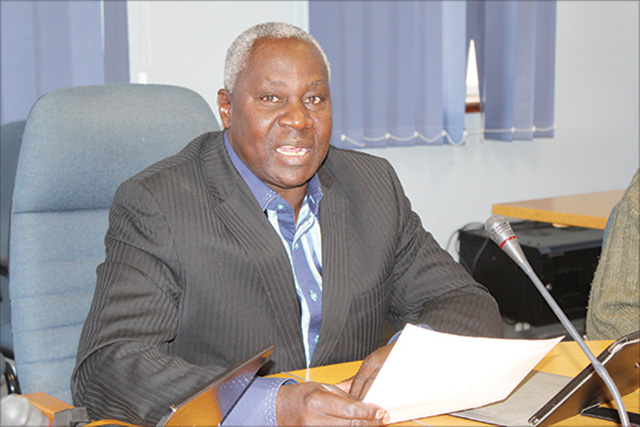The genocide negotiations between Namibia and Germany, that culminated in the nebulous Joint Declaration (JD), ought to have been started on the strength of a resolution of the Namibian Parliament of 2006, that emanated from a motion tabled by the late president of the National Unity Democratic Organisation (Nudo), Chief Kuaima Riruako.
A motion which was predicated by the government of the Federal Republic of Germany acknowledging the genocide committed against the Ovaherero and Nama by Imperial Germany, apologising and atoning eventually in one form or another, as may befit an atonement in the case of a crime of genocide in terms of international law and/or accepted norms political, moral and otherwise. The JD falls short in several aspects. These render the credibility, transparency and acceptability of the process, content and outcome of the declaration problematic. The JD does not delineate an effective comprehensive reparation to victims, including adequate restitution of confiscated land, compensation, psychosocial and physical rehabilitation, and satisfaction in the interest of the direct genocide victims (Ovaherero and Nama).
Thus the 1.1 billion euros agreed settlement is not commensurate with the loss of lives, livestock, land, culture and dignity. Accepting this meagre payment is either a big error of calculation which is improbable, therefore, or it is a straight betrayal of the victim community and a clear travesty of justice. Similarly, the JD does not spell out the measures which have been adopted to establish the truth about the facts and circumstances surrounding violations, including sexual violence committed against indigenous women and girls.
The narrative that guides the JD is predicated on the perspective of the Germans, for example the resolutions of the German Bundestag of 1989 and 2004 are used as justification for development assistance and reconciliation. These are irrelevant to the subject matter which is genocide reparations.
The German Bundestag resolution of 1989 is actually an agreement between Swapo and Germany (as initiated by Hans Dietrich Genscher, then German minister of foreign affairs).
Germany ought to have been reminded by the Namibian negotiating team that the so-called question that has to do with the role of non-state actors only within the framework of inter-governmental negotiations had been put to rest in 1952. We recall that in September 1951 Chancellor Konrad Adenauer of West Germany addressed his Parliament: “… unspeakable crimes have been committed in the name of the German people, calling for moral and material indemnity … The Federal Government are prepared, jointly with representatives of Jewry and the State of Israel … to bring about a solution of the material indemnity problem, thus easing the way to the spiritual settlement of infinite suffering”.
In 1951 Nahum Goldman established The Conference on Jewish Material Claims against Germany (also known as the Claims Conference). On 10 September, 1952, after six months of negotiations, a reparations agreement between the Claims Conference, and Konrad Adenauer’s government of West Germany was reached, yet Namibia has not disputed the untruths of Germany that it cannot negotiate with non-state parties.
Though Namibia has, at the legislative level, already recognised that the atrocities of 1904-1908 were indeed Genocide, the JD still insists on the version of Germany that what happened in 1904-1908 is only Genocide‘in today’s terms’.
The Namibian negotiators ought to have known that the Holocaust (Genocide against the Jews) took place between 1939-1945 before the creation of the UN Convention on the Prevention and Punishment of the Crime of Genocide on 09 December, 1948, to which Germany is a signatory. Yet, Germany recognises the Holocaust as Genocide and does not have a caveat of ‘’in today’s terms’’, as in case with Namibia.
Moreover, the Ovaherero/Nama Genocide of 1904-1908 was recognised by the UN in the Benjamin Whitaker Report of 1985/6. Similarly, the UN Joint Communication from the Rapporteurs of the Special Procedures of February 2023, has in no uncertain terms opined that the events of 1904-1908 were Genocide, and thus they were also emphatic that what must follow are reparations for the victims.
There is no provision made for the descendants of the victims of genocide who find themselves in the diaspora, nor was there any meaning consultations with them and participation by them.
The cardinal question of the inter-generational trauma, which is perpetual, has not been addressed. No benchmarks and measurable indicators to determine improvement or otherwise, in terms of the standard of living of the Ovaherero and Nama from the funds and programmes of the 1.1 billion euros, in any one-time frame have been indicated.
Since the JD does not anywhere mention the word Reparation, it is obvious that it has nothing to do with reparations for which the objective ought to be reparatory justice. This is again clear evidence of the travesty of justice.
The JD is silent on enlisting German companies who profited from forced labour and expropriations in Namibia to contribute towards indemnification.
In addition to the foregoing, the majority of Ovaherero/Nama (OTA, NTLA, Okandjoze Chiefs’ Assembly), political parties, church groups, prominent individuals from the Ovaherero and Nama communities, have rejected the JD in toto. Thus, there is a strong and compelling case to reset the negotiations including all representatives of the descendants in the presence of the United Nations and the African Union.
Why is Namibia ready to sign the disjointed JD which is misaligned with the aspirations of the Ovaherero and Nama, the international law and International Conventions?
*Usutuaije Maamberua
Descendant of the Ovaherero/Nama Genocide Victims


